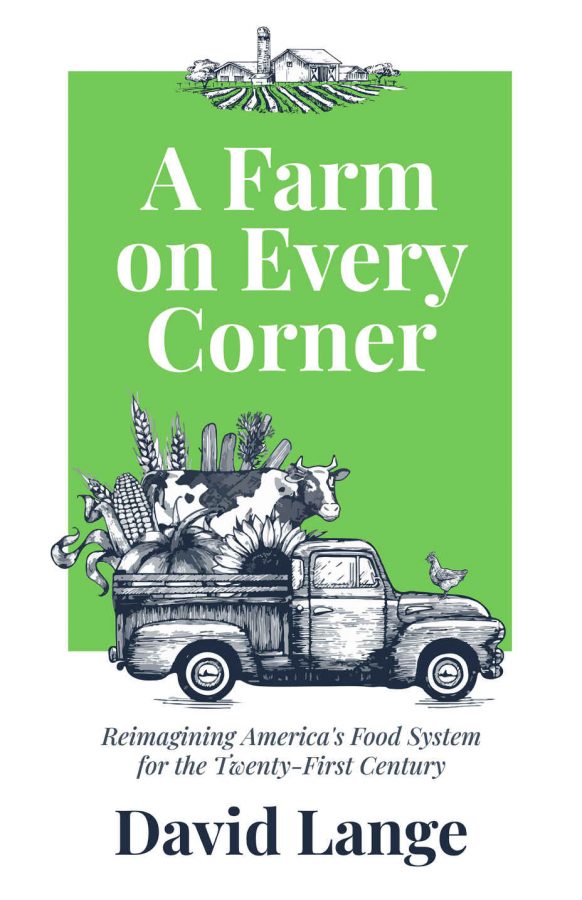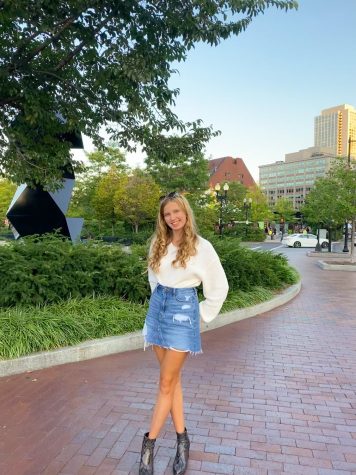SPF graduate David Lange explores America’s food systems in his new book ‘A Farm on Every Corner’
January 11, 2021
Scotch Plains-Fanwood High School graduate David Lange thought he would be joining the Peace Corps after college. Instead, he found himself in the restaurant industry.
Upon graduating from SPFHS, Lange embarked on a journey to Washington, D.C. to study International Development at George Washington University. He figured he would end up working in the US Department of State, perhaps in some branch of government foreign service. He was accepted into the Peace Corps, but along with 40 percent of applicants, he could not take his two-year trip to Ethiopia due to a snafu with medical and security clearance.
“I was bummed,” Lange said. “Right? I was thinking, ‘What am I gonna do with my life now?’ No idea.”
Instead of spiraling into a post-graduation state of complete hopelessness, Lange got a job managing his local farmer’s market.
“Meeting the producers of our food and really seeing the kind of community that comes with locally sourced food was incredible,” Lange said. “I just became completely obsessed and just started researching…and reading…. I knew if I really wanted to know more about food systems and food sovereignty issues, I had to teach myself.”
He recalls one instance at about 8:10 a.m. on one of the many Saturday mornings he spent at the market that particularly stood out. The market opened at 8:00, and shortly thereafter, a Spanish-speaking couple approached him at the information desk. Lange, who luckily spoke the language, learned that the couple had traveled a great distance to the market because they needed groceries and were on a government food program. Unfortunately, the market couldn’t accept the particular program that this couple was getting aid from.
“I had to be like, ‘we, we don’t accept that,’ and to watch the smiles on their faces just evaporate was so heartbreaking,” Lange said.
Lange reached into his wallet and handed the couple cash; he didn’t want them to return home without food to put on their table, especially after making the long trek to the market. He believes this neighborly behavior is at the core of the market.
“I was thinking about that experience for days afterward,” Lange said. “You and I just go to the grocery store; it’s no big deal…. We just go get food, whatever, and to know that it’s not that easy for so many people, and that they had to go out of their way just for this, and that there are so many structural and systemic barriers for so many people in this country to have the nutrition that we should all have as a human right. That was a very impactful little vignette.”
When he was still in college, Lange interned at a local D.C. restaurant, Beefsteak. Ironically, Beefsteak is the self-proclaimed “center of the veggie universe,” focusing on bringing local vegetables directly to patrons. While he was studying at college, Lange was very vocal about how much he loved the food at Beefsteak, so he was offered a job as a marketing intern for the restaurant.
“That was how I should have known that [I] was [passionate about food]; I was that excited about locally-sourced asparagus,” Lange said.
Lange’s affinity for this asparagus was the “surface level” of his passion for food. As he continued his work for Beefsteak, he began to ask bigger questions about the nature of our food systems in America.
“[I] really delved into the more cerebral, the more intellectual parts of [the food system],” Lange said. “Like, how does the food system function? How do all of these little interlocking pieces fit together to create this massive superstructure through which we obtain our food?… How does 40% of [all the food in the world] get wasted, and yet we have millions of people go hungry, and that one in six children in the United States live in food-insecure households?… And when you really start to ask those questions, you start to [see] some bigger political issues [regarding] how our resources… are distributed. And who benefits, who is really profiting off of the current system? I think that that is really the crux of the matter.”
Instead of pondering these questions on his own, Lange decided to answer them in a book.
In his book, A Farm on Every Corner, Lange explores the nature of America’s food system, [and how it] places these barriers in front of people like that couple he met at the market. Moreover, he champions a decentralization and localization of food production, emphasizing the incredible possibilities that are found in places where “food meets community.”
“We must strive towards a more robust and sustainable and healthy and prosperous and tastier future if we really want to survive as a species,” Lange said. “…I dare my readers to imagine a better world. And [to realize] that it’s very much possible.”
Lange’s book, A Farm on Every Corner, is available on Amazon now. Click here to purchase your paperback or digital copy.



